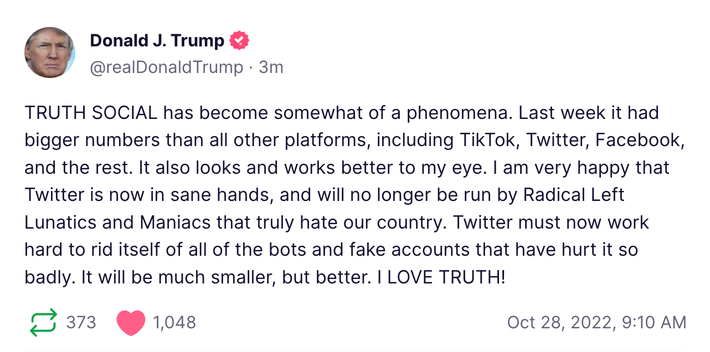
If you are reading this, there is a good chance you’ve never seen one of Donald Trump’s Truth Social posts in its natural habitat. The former president’s Twitter clone launched in February, but he didn’t start “truthing” in earnest until May, and many of his family members still aren’t using the social-media site. Most people learn about Trump’s more newsworthy “truths” when they’re recounted by journalists in mainstream outlets. And sometimes, Twitter users screenshot Trump’s posts so they can argue with him on their own turf, which is how Elon Musk wound up feuding with Trump on the platform that famously banned the ex-president.
Thus, when Trump responded to the news that Musk had finally closed his deal to buy Twitter for $44 billion with this “truth,” which tacitly addressed his potential unbanning, there was quite a bit of chuckling:
But Trump’s opening assertion about his troubled social-media network was somewhat accurate (if not grammatically sound). On Tuesday, November 1, the New York Times reported that while Truth Social’s various business problems have put its long-term survival in doubt, the site itself has “only grown more influential in conservative circles ahead of the midterm election.” After his slow start, Trump now uses the site frequently — issuing political endorsements, attacks on his many enemies, and retruths of MAGA memes (with some winking nods to QAnon thrown in). And conservatives are increasingly flocking to Truth Social over its rivals, per the Times:
He is now joined on Truth Social by a coalition of right-wing Americans, including conservative celebrities like Dan Bongino, the radio host and television commentator; political firebrands like Representative Marjorie Taylor Greene of Georgia; and a constellation of conspiracy theory peddlers, far-right influencers and rank-and-file voters.
The website had 1.7 million unique visitors from the United States in September, according to estimates from Similarweb, a company that monitors web traffic. That barely registers as competition against mainstream sites like Facebook and Twitter. But it towers over Truth Social’s closest social media rivals, including Gab, Parler, Gettr, MeWe and Minds, which averaged about 360,000 unique visitors from the United States that month.
So one could plausibly argue that Truth Social is “somewhat of a phenomena” among alternative social-media sites. But compared to the mainstream social-media world from which Trump was expelled, Truth Social’s performance isn’t that impressive. In the second quarter of 2022, Twitter reported 237.8 million daily active users. When Trump was banned from Twitter in January 2021, he had around 88 million followers; according to his Truth Social profile, he now has 4.43 million.
While it’s too soon to say whether Musk-led changes will prompt an exodus from Twitter, at the moment, it seems like Truth Social may have limited opportunities for growth. Last month, the Pew Research Center released a study of seven of the biggest alternative social-media sites: BitChute, Gab, Gettr, Parler, Rumble, Telegram, and Truth Social. It found that only 6 percent of Americans get news from at least one of these sites and that no single site is used for news by more than 2 percent of U.S. adults. Surveyed users told Pew that they are largely satisfied with their experience on these sites and feel the information they learn there is accurate. But nonusers tend to see the sites as cesspools of right-wing misinformation and extremism — with good reason. As Pew explains:
The study found a noteworthy percentage of prominent accounts on these seven newer sites (15%) have been banned or demonetized elsewhere on social media.
Perhaps connected to that, Americans who have heard of these sites but do not use them as sources for news are skeptical of them. When asked for the first thing that comes to mind when thinking about alternative social media sites, people in this category commonly cite inaccuracy and misinformation, political bias and the political right, and extremism and fringe ideas.
Other elements of the study speak to some of these associations. A small but measurable share of prominent accounts across these sites (6%) mention a connection to the set of conspiracy theories known as QAnon. And an analysis of recent content posted by prominent accounts on these sites finds that the most common phrases include some that are controversial and even inflammatory such as wariness toward vaccines and negative associations with LGBTQ people. Moreover, one of the most prevalent destinations for links found in these posts is The Gateway Pundit, a digital outlet that has been criticized for publishing false information.
Could Truth Social change its negative reputation and become the free-speech bastion that Trump originally promised? Theoretically — but it might not survive long enough to try. Trump Media and Technology Group, Truth Social’s parent company, was betting on a $1.3 billion cash infusion via Digital World Acquisition Corp., a special-purpose acquisition company that planned to take Trump’s company public. But Digital World is now under investigation by both federal prosecutors and securities regulators and could be forced to liquidate in December.
Trump may legitimately “LOVE TRUTH!” and he must be excited that his app is finally available to Android users, who make up around 40 percent of the U.S. mobile-device market, but if he hopes to directly reach the kind of audience he once did on Twitter, he probably shouldn’t be so quick to reject whatever unbanning deal Musk offers him.
More on truth social
- If Trump Won So Big, Why Is His Media’s Stock Cratering?
- Trump Media Has Major New Problems
- Trump’s Inane ‘Play by Play’ on VP Debate: What You Missed































